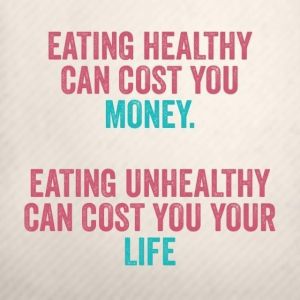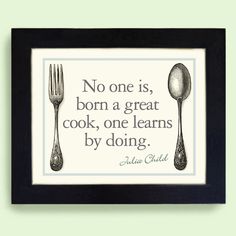In our last post we cited three suggestions as to why it feel like good food is a burden on our budgets:
~ The business model of industrial agriculture has placed the dollar as the ultimate bottom line. While this is necessary for any business small family farmers have very different values.
~ Low quality foods (mass-produced processed foods) may have a greater volume on your plate but your body will need more of it to feel satiated. I believe this is why our standard portion sizes have grown so much over the years. There is even talk of our populations being malnourished because we aren’t getting the quality nutrition we require from our “Standard American Diet”.
~ Prepackaged and fast foods are convenient and have been on the market for so long that a great many people simply do not know how to cook anymore. Many people are intimidated by their kitchens and simply don’t feel comfortable trying something new.
 Our previous post talked about industrial factory farms looking for creative ways to reduce their production costs including using ingredients such as junk food and food waste when raising animals for consumption. We determined that “cheap inputs and a higher volume means a lower end price” and that industrial factory farms can bring in their materials at prices that are not available to small family farms.
Our previous post talked about industrial factory farms looking for creative ways to reduce their production costs including using ingredients such as junk food and food waste when raising animals for consumption. We determined that “cheap inputs and a higher volume means a lower end price” and that industrial factory farms can bring in their materials at prices that are not available to small family farms.
Today though let’s focus on the second two suggestions in our original list: Our need to eat more of the cheap food in order to feel full, and intimidation of food preparation.
Just like a mass-produced piece of furniture is very different from a handcrafted piece, industrially mass-produced food is of lower quality and nutrient value because of how it is produced. That old saying “You get what you pay for” is true but we may not have to “pay the piper” for years to come, after our health and environment has suffered long enough to get our attention.
 In the previous post I shared an example from our family’s experience regarding homemade bread vs store-bought bread: Making it myself was indeed cheaper, even with good quality ingredients, and we found that in order to feel satiated we needed less homemade bread than the store-bought bread in our meals. This clinched my belief that better foods can equal smaller meal sizes. When we eat quality food we feel satiated and nourished sooner and we don’t feel hungry again so quickly. I also mentioned that learning how to make more meals from the food I do buy was also revolutionary – for example, a whole chicken or bone-in meat provides for several meals when we first eat the meat and then use the bones/carcass to make a big pot of soup and then, even to make bone broth after the soup is finished. Learning how to cook from scratch and use the “left overs” really stretches your food dollars and provides a good quality food for your family.
In the previous post I shared an example from our family’s experience regarding homemade bread vs store-bought bread: Making it myself was indeed cheaper, even with good quality ingredients, and we found that in order to feel satiated we needed less homemade bread than the store-bought bread in our meals. This clinched my belief that better foods can equal smaller meal sizes. When we eat quality food we feel satiated and nourished sooner and we don’t feel hungry again so quickly. I also mentioned that learning how to make more meals from the food I do buy was also revolutionary – for example, a whole chicken or bone-in meat provides for several meals when we first eat the meat and then use the bones/carcass to make a big pot of soup and then, even to make bone broth after the soup is finished. Learning how to cook from scratch and use the “left overs” really stretches your food dollars and provides a good quality food for your family.
Then there’s the issue of nutrient value and natural nutrients vs synthetic nutrients. Nutritionists and other medical professionals are finding that our “Standard American Diet” (known as S.A.D.) is not only producing a tremendous increase in rates of disease, but that even obese people are found to be malnourished. Science is validating my firm belief that our bodies (and the bodies of animals) are created to recognize natural nutrients and when a synthetic nutrient is introduced our bodies (and animal bodies) don’t respond the same way. If you look at the labels on processed foods you will find that things are “enriched” with certain vitamins and minerals. These are synthetic nutrients. I know that in my life and in my family, I have observed these things to be true: It may not actually cost more to provide my family with healthier foods today and doing so has made for a healthier family in the long run, and that has cut down on health-related costs and improved our income with fewer sick days and an improved ability to work well. When we’re eating good quality food instead of highly processed foods we will need to eat less in order to feel full which (think of your budget) and we will find benefits in our overall health today and in the future (think of your future budget).
How can we cut back on food costs and buy better food? Buy what you can locally. Look for Farmer’s Markets in your area, buy a share in a CSA (Community Supported Agriculture), buy your meat and eggs from us or find a local farmer like us in your area, find wholesome raw milk too. This is a fantastic start! But the step that will make the greatest impact in your budget is to learn to love your kitchen.
Cheap foods are convenient and for many of us, it’s all we have known. Our society has forgotten how delightfully satisfying it is to prepare meals for, and with, our families at home. Talking with young adults and young families, the great majority of them are intimidated by the thought of preparing food from scratch. In fact a young relative of ours was telling me how she loves to bake and when I asked her what recipes she likes  the most she replied, “I like the chocolate chip cookies in the tube” – meaning refrigerator dough purchased at the grocery store. I asked if she had ever made cookies from scratch, from ingredients, and she hadn’t heard of such a thing. In today’s world convenience is a tremendous value and we think of cooking from scratch as “too hard” or “slaving in the kitchen”. It’s time that we make a change and learn to feel comfortable in our own kitchens once again – like Grandma was!
the most she replied, “I like the chocolate chip cookies in the tube” – meaning refrigerator dough purchased at the grocery store. I asked if she had ever made cookies from scratch, from ingredients, and she hadn’t heard of such a thing. In today’s world convenience is a tremendous value and we think of cooking from scratch as “too hard” or “slaving in the kitchen”. It’s time that we make a change and learn to feel comfortable in our own kitchens once again – like Grandma was!
 We can learn to make superfoods like bone broth from the bones that are left over from our meals, we can make wonderful comfort foods like stews and soups, we can drop a roast and vegetables in the crock pot in the morning on a busy day so we can come home to a delightful homecooked meal with healthy ingredients (and then save any bones for bone broth later). Breakmaking sounds intimidating at first, but trust me, once you try it a few times you’ll be hooked. Even baking pumpkin pies from scratch is easy – an actual pumpkin and not from a can – and the taste is over the top. Ask Mom for your favorite childhood recipes and ask your friends for their favorite recipes, and then start to build up a diverse recipe collection of your own. Your family will be so delighted with the smells and tastes that fill your home. Once you begin to feel confident with a few recipes, a whole new world opens up before you and meals don’t need to cost as much as they once did.
We can learn to make superfoods like bone broth from the bones that are left over from our meals, we can make wonderful comfort foods like stews and soups, we can drop a roast and vegetables in the crock pot in the morning on a busy day so we can come home to a delightful homecooked meal with healthy ingredients (and then save any bones for bone broth later). Breakmaking sounds intimidating at first, but trust me, once you try it a few times you’ll be hooked. Even baking pumpkin pies from scratch is easy – an actual pumpkin and not from a can – and the taste is over the top. Ask Mom for your favorite childhood recipes and ask your friends for their favorite recipes, and then start to build up a diverse recipe collection of your own. Your family will be so delighted with the smells and tastes that fill your home. Once you begin to feel confident with a few recipes, a whole new world opens up before you and meals don’t need to cost as much as they once did.
Science has learned that when we know where our food came from, when we have some sort of connection to it, our bodies produce certain enzymes that help us absorb the nutrients from that food. When we’re disconnected from our food sources those enzymes don’t get produced in our digestive process. Whether our food is homemade or homegrown, our bodies are able to utilize  what we’re giving it just like our forefathers did when they grew, hunted, and prepared everything they ate. When we take time to sit down to dinner with the family like we used to we again produce digestive enzymes that benefit our health. Cooking together and eating together has so many benefits in so many areas of our busy lives, it’s well worth the effort to adjust our habits to include these things, and it’ll save your money.
what we’re giving it just like our forefathers did when they grew, hunted, and prepared everything they ate. When we take time to sit down to dinner with the family like we used to we again produce digestive enzymes that benefit our health. Cooking together and eating together has so many benefits in so many areas of our busy lives, it’s well worth the effort to adjust our habits to include these things, and it’ll save your money.
